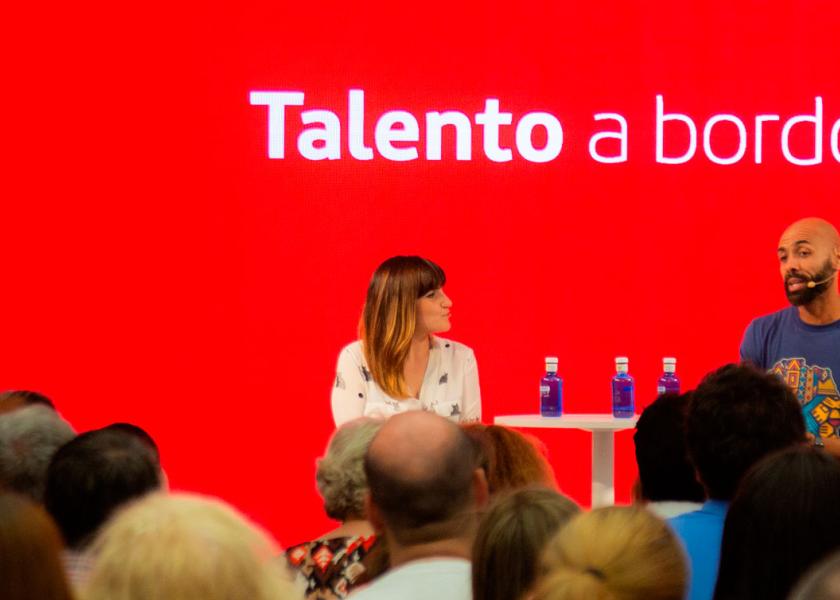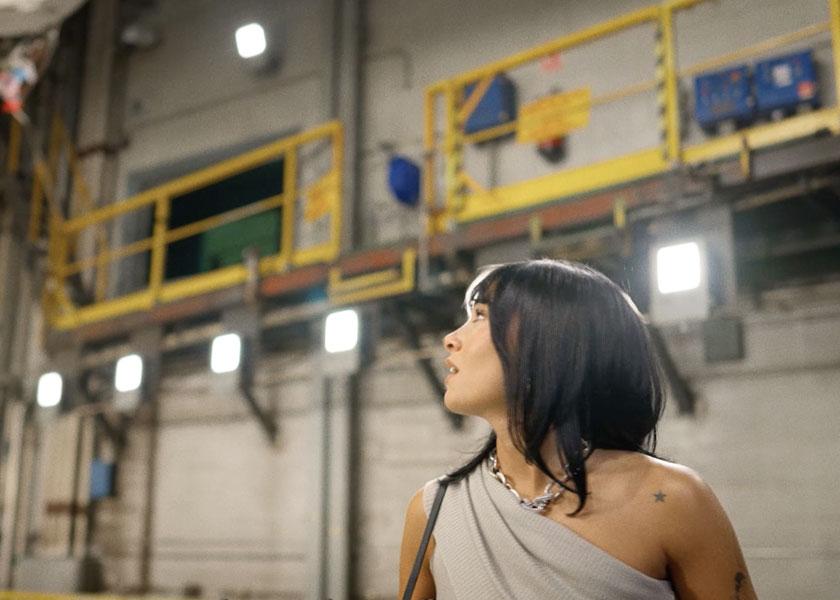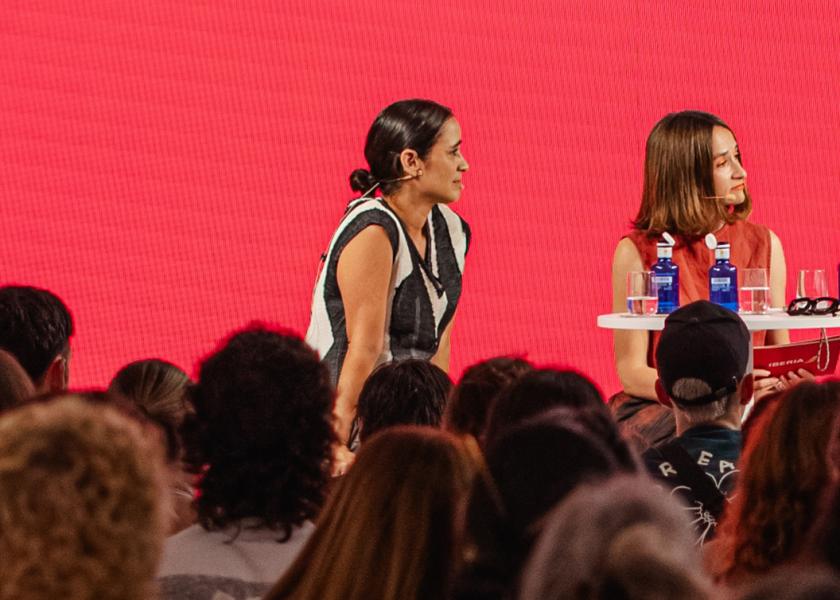Rozalén
Stories to tell and sing
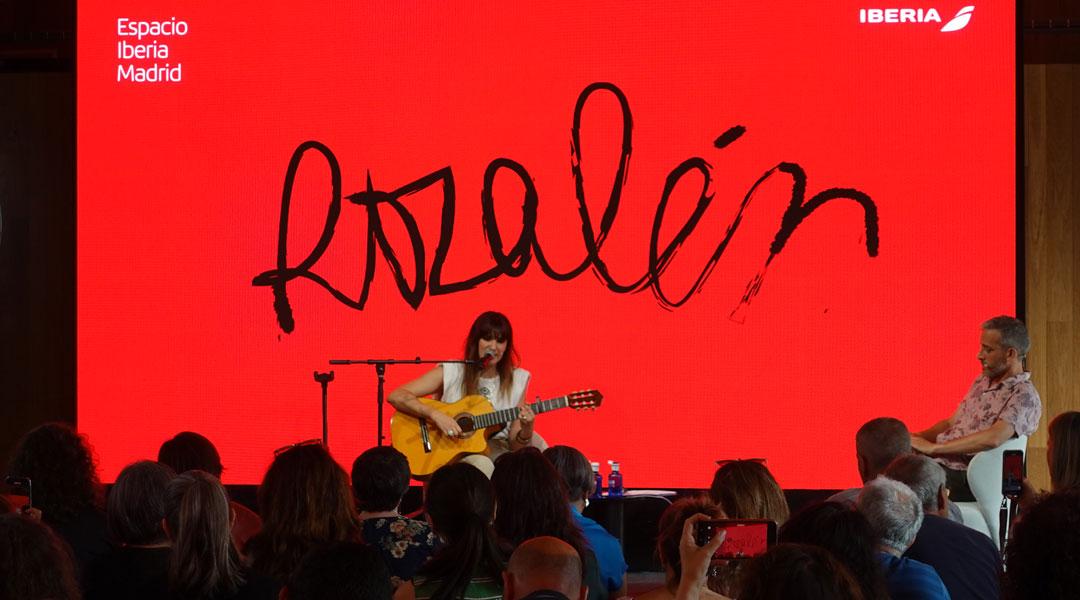
Rozalén, the best artist of the year according to the Premios de la Academia de Música [Music Academy Awards], visited Espacio Iberia like she did in 2024. This singer-songwriter from Albacete revealed the secret to her long-lasting connection with her audience: “With me, they get the real deal.” With her usual straightforward and warm tone, she tells us why she was surprised by these awards, how she relates to her own songs, her experience with the classics by Chavela Vargas…
Rozalén, born in Albacete in 1986 and raised in the village of Letur, is known for her social commitment and love for her roots. At her concerts, the author of La puerta violeta —which has turned into an anthem against domestic violence— touches the hearts of her audience and leads them from laughter to tears, from introspection to euphoria. She did so recently —always accompanied by her sign-language interpreter— at Noches del Botánico, a festival sponsored by Iberia, which she’s a fan of. And with her usual down-to-earth frame of mind, which those who saw her at Espacio Iberia were able to verify in person.
Her tour of her latest album, El abrazo, was one of the top 5 most successful tours in Spain in 2024. This year, Spain’s Academia de la Música gave her three awards: Best Artist, Best Pop Album, and Best Singer-Songwriter Album.
You recently received the Award for Best Artist of the Year from the Academia de la Música in Spain and said: “I don’t know why, but I don’t feel like I deserve it.” What do you think now, after the surprise has worn off?
I wasn’t expecting it, I was certain I wasn’t going to win! I thought Amaia or Dani Fernández would get it. I felt like I shouldn’t be there, that it wasn’t my time, that other artists were under the spotlight… However, after thinking it over and talking to colleagues, I said to myself: why shouldn’t I have my moment? This award has been a wake-up call to value myself more and be aware of the work I’ve put into this. For example, last year we were one of the tours that attracted the most people, and I was the first woman in terms of numbers. So, why do I have this image of myself?
“This award has been a wake-up call to value myself more and be aware of the work I’ve put into this”
You’ve also just had two unforgettable nights at Noches del Botánico…
The last two weeks have been thrilling… After the award from the Academia de la Música, a concert at Jardines de Viveros, Valencia, and then two nights back-to-back at the Botánico. I’m a fan of the festival, I go to see other artists a lot. The setting is wonderful; they work really hard and have received awards… Playing there always feels incredibly special to me. And in Madrid, the place I’ve chosen to live… It means playing at home, with the thrill, nerves and pressure that entails. My friends María Ruiz, Mr. Kilombo, Pedro Pastor and El Kanka also came to sing with me. I felt joyous euphoria. To top it all off, it was my birthday a few days later!
When you share your songs with the audience, do they garner new meaning?
Yes, like Vivir, a song I worked on with women receiving cancer treatment. I once met María Belón, a survivor of the 2004 tsunami, and she told me that song was about her. The first verse roughly translates as: Something important has happened, I’ve reset the counter, it was like a giant wave, it cleaned me out and left me naked on the seashore. It was literally her story! The incredible thing about songs is that we each apply them to our lives. For me, as the songwriter, they also change as time and life goes by.
With your songs, you have expressed a wide range of feelings and moved thousands of people. Is there still something you haven’t managed to express through music?
There are so many things that I don’t know how to express with words… And obviously, there are still experiences I haven’t had yet. They will come… I still have plenty of stories to tell and sing.
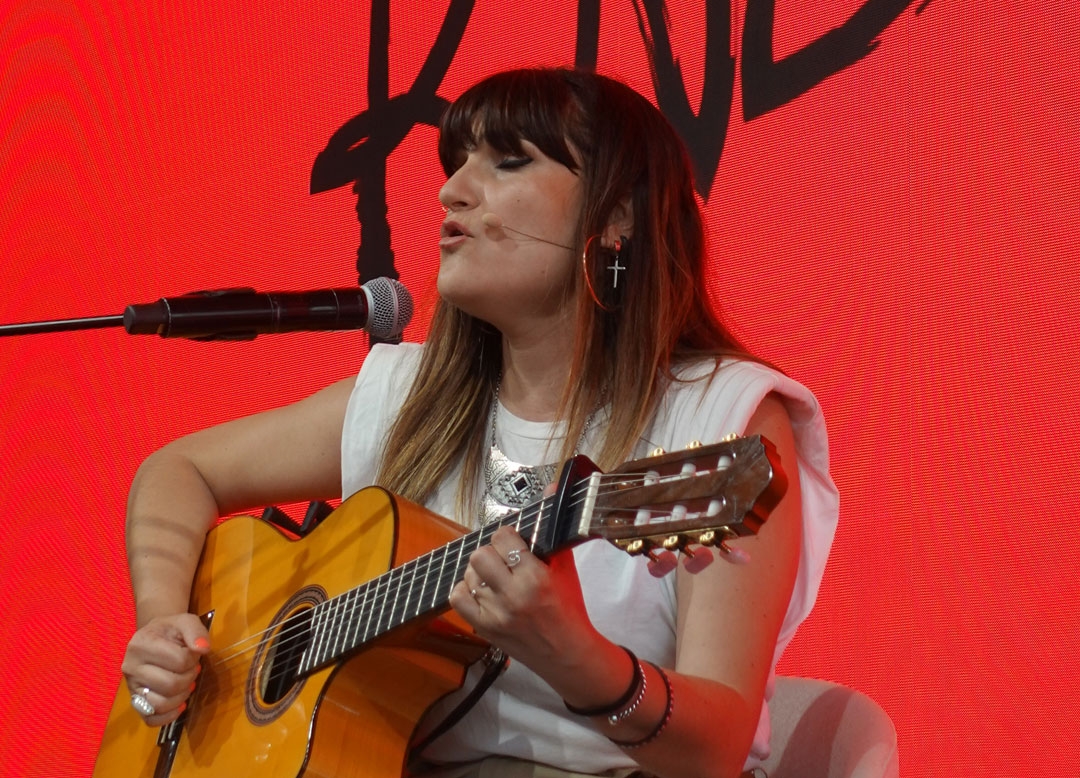
At Espacio Iberia, Rozalén moved the audience with the song 'Entonces' in which she talks about her childhood.
The audience always asks artists for their ‘classics.’ How does it feel to inhabit songs composed during previous phases of your life?
Indeed, the more albums and songs you have, the harder it is to choose the set list for a concert. In fact, we have a section where we combine many songs that we know people ask for; to give them a taste and make their wishes come true. I feel fond of all of them, although I get tired of some songs more than others… I know there are songs I’ll be singing my whole life: they are my daughters, I love them, they remind me of the moment I wrote them, and they are important to people. So, I sing them joyfully.
“I know there are songs I’ll be singing my whole life: they are my daughters, I love them, they remind me of the moment I wrote them, and they are important to people”
Last year at Espacio Iberia, you told that it took you five years to make the pieces of El abrazo fit. Do you struggle to write songs more now, with so many distractions and stimuli, than at the beginning of your career?
No. It has more to do with self-imposed standards or the number of things I want to say. There’s a song on El abrazo, called Entonces, which took me a long time to write because it’s about my childhood in Letur: I wanted to say so many things that I struggled to choose the best to build the perfect puzzle. I’m a perfectionist, I want to dedicate more time to poetry, to doing a better job. But some songs still pour out of me very quickly.
This year, you published an EP called Rozalén por Chavela. What has getting close to this Mexican singer been like?
It was because of the play Chavela [directed by Carolina Román], my first experience as an actress. It was an incredible challenge, a lot of work and lessons. My record label told me it was the perfect time to capture some of the classics she used to sing, with arrangements by Los Macorinos, and pay homage to her. Chavela is one-of-a-kind. I’ve approached these classics, trying to find the performance, the emotion in her low pitch.
“I believe that one of the things that people connect with the most is that we seem like ordinary people, they see me as a down-to-earth person”
During the process, did you discover new connections to Latin-American music?
I believe the connections with Latin-American music are in each thing we make, not only Chavela’s album. In El abrazo there are many nods to Venezuela, Colombia… And in my previous album, to Mexico, there was even a Cuban son. By sharing so many things with so many countries on the other side of the pond, you discover new rhythms and blends… That’s always rewarding.
How did the idea of including Beatriz Romero, your sign-language interpreter, come about?
Everyone already knows that our interpreter is going to be there, sharing the stage with me. I think that’s been the biggest innovation: Beatriz is onstage all the time and is part of the show, she’s not pushed to one side. And we’ve worked like this for years. We connected when we met in Bolivia. At the time, I was studying Social Psychology, and she worked with deaf people at a high school in Albacete.
In the past, you’ve defined talent as doing something that you’re naturally good at and that awakens something in other people. What do you think Rozalén awakens?
I believe that one of the things that people connect with the most is that we seem like ordinary people, they see me as a down-to-earth person. People tell me that I make them cry easily and also laugh. Perhaps they can feel how closely and naturally I deal with emotions, or I talk about things we all feel. As they say that truth always wins, maybe that’s it: with me, they get the real deal.
